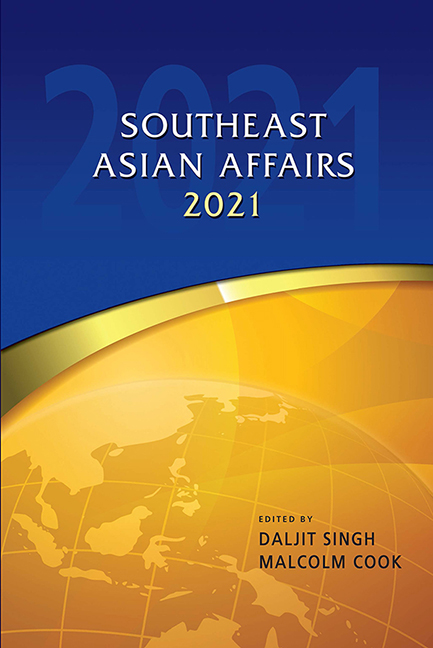Cambodian Foreign Policy in 2020: Chinese Friends and American Foes?
Published online by Cambridge University Press: 09 October 2021
Summary
Cambodia currently finds itself caught between Beijing and Washington in a geopolitical tug of war. Strategic competition in the Indo-Pacific has intensified since the election of Donald Trump in 2016. The United States has confronted China over perceived unfair trading practices and intellectual property theft, human rights abuses in Xinjiang and Hong Kong, and aggressive behaviour in the South China Sea and Mekong region, and in October 2020 it ordered the Chinese consulate in Houston to close over concerns about economic espionage. China has responded in kind, through increasing tariffs on American products, expelling American journalists and revoking visa exemptions for US diplomatic passport holders in Hong Kong and Macau.
Central to the Indo-Pacific, Southeast Asia finds itself as the primary theatre of US-China strategic rivalry. Positioned within this context, Cambodia appears to be caught in the middle of tensions between Washington and Beijing as it seeks to balance relations without compromising its interests. Both the United States and China are crucial to Cambodia's development and, of course, the Cambodian ruling elite's maintenance of power. Chinese investment and development assistance have contributed significantly to Cambodia's national development, albeit with some reputational risks associated with Beijing's generosity. Meanwhile, Washington has tended to prioritize investment in Cambodia's civil society organizations, with an emphasis on addressing governance, corruption and human rights issues—much to the annoyance of the Cambodian government.
For small authoritarian states like Cambodia, regime survival is a key driver of foreign policy towards great and regional powers. In the wake of increasing geopolitical rivalry between the United States and China, Cambodia increasingly finds its foreign policy shaped by the power play between these two superpowers. This chapter explores Cambodia's contemporary foreign policy in the context of US-China great power rivalry. First, it proceeds by providing a brief overview of how Sino-Cambodia and US-Cambodia relations have developed over recent decades and key events leading to 2020. A review of Phnom Penh's foreign policy to date shows that Cambodia has steadily disengaged from Washington and moved closer to Beijing on a number of key issues; nowhere more so than in the realms of economics and defence.
- Type
- Chapter
- Information
- Southeast Asian Affairs 2021 , pp. 92 - 104Publisher: ISEAS–Yusof Ishak InstitutePrint publication year: 2021

